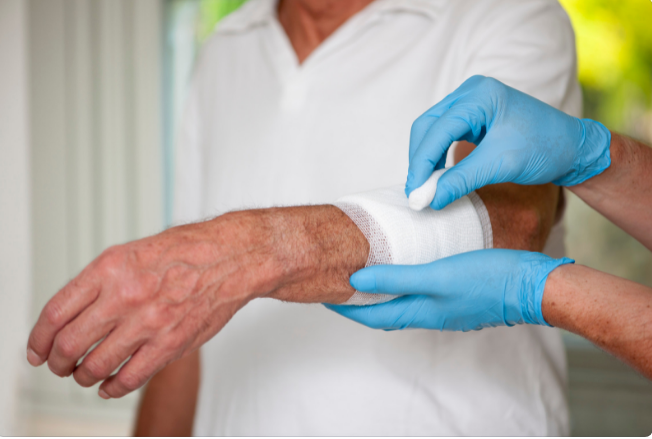For wound care, your body needs specific nutrients to rebuild damaged tissue, fight infection, and restore skin integrity. The healing process demands more energy and resources than normal daily functions. Without adequate nutrition, wounds may take longer to heal, leave scars, or develop complications. Here is how to make informed dietary choices during the healing period:
Helpful Vitamins
Several food ingredients directly impact your body’s ability to repair damaged tissue. Vitamin C supports collagen synthesis, the protein that gives structure to new skin and blood vessels. Without adequate vitamin C, wounds may heal poorly and form irregular scars. Citrus fruits, bell peppers, strawberries, and broccoli offer excellent sources of this vitamin.
Vitamin A may promote processes necessary for tissue regeneration. Sweet potatoes, carrots, spinach, and liver contain ingredients your body converts to vitamin A. This vitamin also may support immune function, helping prevent wound infections.
B vitamins, particularly B12, B6, and folate, may help transport oxygen to healing tissues and provide building blocks for new cells. Meat, eggs, dairy products, and leafy greens supply various B vitamins. Zinc directly affects the speed and quality of wound healing. Oysters, beef, pumpkin seeds, and legumes may provide substantial zinc content.
Enough Protein
Protein is a key nutrient in wound care, as it provides the building blocks necessary for repairing damaged tissue. When your body is healing, it requires an increased amount of protein to produce collagen, which is a key component of new skin and scar tissue. Insufficient protein intake during recovery may slow down the healing process, weaken your immune response, and increase the risk of infection. Incorporating high-quality protein sources, such as lean meats, fish, eggs, dairy products, legumes, tofu, and nuts, into your diet provides your body with the necessary resources to rebuild and restore itself efficiently. If you’re facing challenges meeting your protein goals through food alone, consult a healthcare provider.
Sufficient Macronutrients
Protein requirements may increase significantly during wound healing. Your body requires amino acids to construct new tissue, produce enzymes, and maintain a healthy immune function. Aim for high-quality proteins from lean meats, fish, eggs, dairy, legumes, and nuts. The amount needed depends on the wound size, your overall health, and the rate of healing progress. Carbohydrates provide energy for cellular repair processes.
Nutritional Counseling
Working with a registered dietitian helps optimize your nutrition plan for wound healing. These professionals typically assess your current dietary intake, identify nutrient gaps, and create personalized meal plans. They can account for your medical history, medications, food preferences, and practical limitations.
Nutritional counseling becomes particularly valuable for people with chronic wounds, diabetes, or other conditions that affect healing. A dietitian may recommend specific supplements, timing of meals, or food combinations that enhance nutrient absorption. They may also help address challenges such as poor appetite, difficulty chewing, or financial constraints that limit food choices.
Get Wound Care Guidance
Nutrition is a key component of comprehensive wound care. While proper nutrition supports healing, a professional medical evaluation is necessary for any wound that doesn’t show improvement within a few days. Contact our wound care specialists to develop a comprehensive treatment plan that combines medical interventions and nutritional support for optimal healing outcomes.
Social Sharing
Your Content Goes Here
Latest Posts

